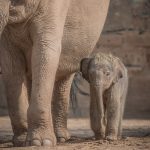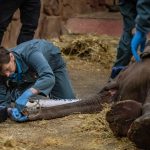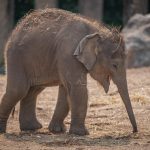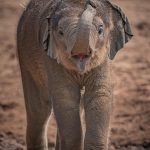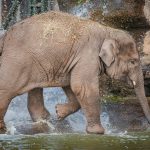Partners and collaborators
DEVELOPING NEW WAYS TO MONITOR HEALTH AND WELLBEING
Elephants are one of the most popular and prolific animals for zoo visitors and often the first animal seen on a visit to Chester Zoo. In the wild, Asian elephants live in complex family groups consisting of multi-generational females and their offspring.
The Hi-Way herd is exactly like this, with females of multiple generations and their calves living together here at Chester, a keystone in the European Asian elephant breeding programme. We’re constantly looking at new ways to enrich the Hi-Way elephants’ lives, whether that’s through creating new ways to encourage natural foraging behaviours, or changing the environment to encourage exploration and play. But what’s most important to us is the health and wellbeing of our animals, and our dedicated keepers, vets and conservation scientists work hard to ensure this.
Over the past decade, we have been developing new and innovative ways to monitor health and wellbeing of elephant herds. We routinely collect faecal samples to assess the reproductive health of our herd, of which the samples can be used to detect a number of important health indicators, from pregnancy to predicting birth due dates.
MONITORING BEHAVIOUR
Our keepers developed a night-time behaviour monitoring routine which is used to detect changes in sleep patterns and social interactions. We even used this data to show that the herd sleep for longer periods of time, when the social relationships between individuals were more positive.
Our scientists work with university partners to refine data collection methods and build on the types of information we can gather. Most recently, we developed social network analysis methods to assess herd compatibility and calculated daily activity levels and distance travelled by individual elephants, using two novel methods: a customised computerised app and a specially designed tracking device.
Our truly ‘one plan’ approach to elephant conservation is evident in our collaborative efforts to raise awareness of the deadly Elephant Endotheliotropic Herpesvirus (EEHV). EEHV is a devastating disease which is generally found in young elephants, both in zoos and in the wild. Collectively, we launched our fundraising campaign ‘Never Forget‘ to help educate our supporters on the effects of EEHV, and how they can help support our scientific mission for an effective vaccine. Our veterinary scientists have been working with the University of Surrey and the Animal and Plant Health Agency to detect EEHV using blood samples, before clinical signs appear. This technique is routinely used here at the zoo, and enabled us to successfully treat Indali Hi-Way in 2019, curing her of EEHV. The team are currently investigating the applications of immunology to treat the disease, continuing in their mission to develop a vaccine.
HUMAN-WILDLIFE CONFLICT
Beyond the zoo, populations of Asian elephants are in decline in the wild, and with increasing habitat loss, we’re seeing more instances of human-wildlife conflict as elephants move closer to community areas to forage.
Working with the Wildlife Trust of India in the Greater Manas Landscape of Assam, north east India (where 50% of the remaining wild Asian elephants reside), our goal is to reduce human-wildlife conflict through the building of deterrent measures around critical resources, such as crops (which elephants frequently raid), and supporting initiatives to reduce the pressure on forests, such as encouraging the replacement of wood burners with alternate fuel sources in restaurants. The knowledge gained through observing and caring for elephants at Chester Zoo is being applied in the wild too, with Chester Zoo experts supporting the training of “Haathi Watchers” – members of communities bordering the Manas forests trained in identifying elephant behaviour and providing an early warning system of any risk to nearby villages.
A lot of our research has been published and presented at worldwide conferences, to share the breadth of knowledge we’ve gained, with our peers. We’re incredibly proud to run the annual Resource Management and Husbandry Workshop, which is organised and hosted at Chester Zoo and attended by leading zoo professionals from across the globe.
The workshop provides an opportunity for colleagues to meet and share the latest husbandry techniques, habitat design ideas, behavioural and physiological monitoring methods and hear updates on the ground-breaking research being conducted in the fight against EEHV.
READ MORE OF OUR RESEARCH
- Emma Evison, Andrew McKenzie, & Lisa Holmes, 2020. Social and environmental impacts on sleep in captive Asian elephants (Elephas maximus)
- Gabby Drake, Jonathan Haycock, Akbar Dastjerdi, Hannah Davies, Javier Lopez. 2020. Use of immunostimulants in the successful treatment of a clinical EEHV1A infection in an Asian elephant (Elephas maximus).
- Katie L Edwards, Erin m Latimer, Jessica Siegal-Willot, Wendy Kiso, Luis R Padilla, Carlos R Sanches, Dennis Schmitt, Janine L Brown (2021) Patterns of Serum Immune Biomarkers Druing Elephant endotheliotropic herpesbirus viremia in asian and african elephants
- Taiana Costa, Guido Rocchigiani, Flavia zendri, Gabby drake, javier lopez, julian chantrey, Emanuele Ricci, 2022. Elephant endotheliotropic herpesvirus 4 and clostridium perfringens type c fatal co-infection in an adult asian elephant (elephas maximus).
NOW is the time to ACT FOR WILDLIFE. Conservation is CRITICAL; species are under threat. TOGETHER we can make a BIG difference. Take action TODAY and join us in PREVENTING EXTINCTION.
OUR TEAM OF EXPERTS WORK IN SIX REGIONS AROUND THE GLOBE – REPRESENTING SOME OF THE PLANET’S MOST BIODIVERSE HABITATS. Discover more about our SCIENCE AND CONSERVATION work.





